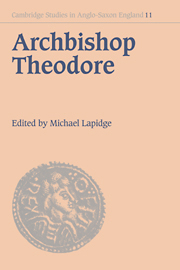Book contents
- Frontmatter
- Contents
- Preface
- List of abbreviations
- 1 The career of Archbishop Theodore
- 2 The Syriac background
- 3 Theodore of Tarsus and the Greek culture of his time
- 4 Rome in the seventh century
- 5 Theodore, the English church and the monothelete controversy
- 6 The importation of Mediterranean manuscripts into Theodore's England
- 7 Theodore and the Latin canon law
- 8 The Penitential of Theodore and the Iudicia Theodori
- 9 Theodore and the Passio S. Anastasii
- 10 Theodore and the Laterculus Malalianus
- 11 Theodore and the liturgy
- 12 Theodore's Bible: the Pentateuch
- 13 Theodore's Bible: the gospels
- 14 Theodore and Anglo-Latin octosyllabic verse
- 15 The Canterbury Bible glosses: facts and problems
- Index
Preface
Published online by Cambridge University Press: 03 May 2010
- Frontmatter
- Contents
- Preface
- List of abbreviations
- 1 The career of Archbishop Theodore
- 2 The Syriac background
- 3 Theodore of Tarsus and the Greek culture of his time
- 4 Rome in the seventh century
- 5 Theodore, the English church and the monothelete controversy
- 6 The importation of Mediterranean manuscripts into Theodore's England
- 7 Theodore and the Latin canon law
- 8 The Penitential of Theodore and the Iudicia Theodori
- 9 Theodore and the Passio S. Anastasii
- 10 Theodore and the Laterculus Malalianus
- 11 Theodore and the liturgy
- 12 Theodore's Bible: the Pentateuch
- 13 Theodore's Bible: the gospels
- 14 Theodore and Anglo-Latin octosyllabic verse
- 15 The Canterbury Bible glosses: facts and problems
- Index
Summary
On 19 September 1990 fell the 1300th anniversary of the death of Theodore of Tarsus, archbishop of Canterbury (668–90). The years immediately preceding 1990 had seen the organization of scholarly conferences to celebrate the anniversaries of various other Anglo-Saxon churchmen – for example, Æthelwold, Cuthbert and Dunstan – but, with the exception of two commemorative lectures arranged by the Dean of Canterbury, the Very Reverend John Simpson, and delivered at Canterbury in September 1990 (by Sr Benedicta Ward and myself), the anniversary of Archbishop Theodore seemed destined to pass unnoticed by the scholarly world. Yet it seemed to myself and to several Cambridge colleagues that so important an anniversary should be commemorated in some way, even if the resources needed for mounting a full-scale conference were lacking. We decided instead to hold a small symposium dedicated to the life and works of Archbishop Theodore, at which a small group of invited speakers would have the opportunity to discuss matters relevant to Theodore, but at which (for logistical reasons) no audience other than the speakers themselves would be present. The symposium took place in Cambridge on 18–19 September 1990 and included the following members (in alphabetical order): Martin Brett, Sebastian Brock, Henry Chadwick, Thomas Charles-Edwards, David Dumville, Christopher Hohler, Simon Keynes, Michael Lapidge, Patrizia Lendinara, Richard Marsden, Patrick McGurk, Thomas Noble, J. D. Pheifer and Jane Stevenson. I should like to express my gratitude to the British Academy for a small grant which helped to defray the costs of transportation for speakers from overseas, to Christopher Brooke for intervening helpfully on our behalf at a crucial moment, and above all to David Dumville for unstinting help in organizing the symposium itself.
- Type
- Chapter
- Information
- Archbishop TheodoreCommemorative Studies on his Life and Influence, pp. vii - xPublisher: Cambridge University PressPrint publication year: 1995

